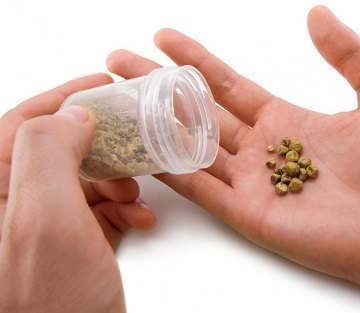Frequent urination can be a symptom of many different problems. When frequent urination is accompanied by fever, an urgent need to urinate, and pain or discomfort in the abdomen, you may have a urinary tract infection. Other possible causes of frequent urination include:
- Kidney Stones
A kidney stone is a solid piece of material which is formed in the kidneys from minerals in urine. Kidney stones typically leave the body in the urine stream, and a small stone may pass without causing symptoms. If stones grow to sufficient size they can cause blockage of the ureter. This leads to pain. Other associated symptoms include: nausea, vomiting, fever, blood in the urine, pus in the urine, and painful urination.
- Interstitial Cystitis
 Interstitial cystitis also known as bladder pain syndrome (BPS), is a chronic inflammatory condition of the submucosal and muscular layers of the bladder. The cause of IC/BPS is currently unknown and the condition is regarded as a diagnosis of exclusion. IC/BPS may be associated with urinary urgency, urinary frequency, waking at night to urinate (nocturia), and sterile urine cultures. Those with interstitial cystitis may have symptoms that overlap with other urinary bladder disorders such as: urinary tract infection (UTI), overactive bladder, urethritis, urethral syndrome, and prostatitis.
Interstitial cystitis also known as bladder pain syndrome (BPS), is a chronic inflammatory condition of the submucosal and muscular layers of the bladder. The cause of IC/BPS is currently unknown and the condition is regarded as a diagnosis of exclusion. IC/BPS may be associated with urinary urgency, urinary frequency, waking at night to urinate (nocturia), and sterile urine cultures. Those with interstitial cystitis may have symptoms that overlap with other urinary bladder disorders such as: urinary tract infection (UTI), overactive bladder, urethritis, urethral syndrome, and prostatitis.
- Menopause
Menopause, also known as the climacteric, is the time in most women’s lives when menstrual periods stop permanently, and the woman is no longer able to have children. Menopause typically occurs between 45 and 55 years of age. Specific treatment is not usually needed. Some symptoms, however, may be improved with treatment. With respect to hot flashes, avoiding smoking, caffeine, and alcohol is often recommended. Sleeping in a cool room and using a fan may also help.
- Urinary Tract infection
 Urinary tract infections don’t always cause signs and symptoms, but when they do they may include:
Urinary tract infections don’t always cause signs and symptoms, but when they do they may include:
- A strong, persistent urge to urinate
- A burning sensation when urinating
- Passing frequent, small amounts of urine
- Urine that appears cloudy
- Urine that appears red, bright pink or cola-colored — a sign of blood in the urine
- Strong-smelling urine
- Pelvic pain, in women — especially in the center of the pelvis and around the area of the pubic bone
UTIs may be overlooked or mistaken for other conditions in older adults.
- Reactive arthritis
Reactive arthritis is a painful form of inflammatory arthritis (joint disease due to inflammation). It occurs in reaction to an infection by certain bacteria. Most often, these bacteria are in the genitals (Chlamydia trachomatis) or the bowel (Campylobacter, Salmonella, Shigella and Yersinia).
- Acute prostatitis
Acute prostatitis is a serious bacterial infection of the prostate gland. This infection is a medical emergency. It should be distinguished from other forms of prostatitis such as chronic bacterial prostatitis and chronic pelvic pain syndrome (CPPS).
- Urge incontinence
 Urge incontinence is a sudden and strong need to urinate. You may also hear it referred to as an unstable or overactive bladder, or detrusor instability. In a properly functioning bladder, the bladder muscle (detrusor) remains relaxed as the bladder gradually fills up.
Urge incontinence is a sudden and strong need to urinate. You may also hear it referred to as an unstable or overactive bladder, or detrusor instability. In a properly functioning bladder, the bladder muscle (detrusor) remains relaxed as the bladder gradually fills up.
- Urethritis
Urethritis is inflammation of the urethra. That’s the tube that carries urine from the bladder to outside the body. Pain with urination is the main symptom of urethritis. Urethritis is commonly due to infection by bacteria. It can typically be cured with antibiotics.
- Autonomic dysreflexia
Autonomic dysreflexia is a syndrome in which there is a sudden onset of excessively high blood pressure. It is more common in people with spinal cord injuries that involve the thoracic nerves of the spine or above (T6 or above).
- Interstitial cystitis
Interstitial cystitis (IC), often called painful bladder syndrome, is a tricky condition. It’s tough to diagnose, and though treatments can make life with it better, there’s no cure. Because IC has such a wide range of symptoms and severity, most experts think it might be several diseases. If you have urinary pain that lasts for more than 6 weeks and is not caused by other conditions like infection or kidney stones, you may have IC.
- Bladder Infection
Bladder infection is an infection of the bladder. Bladder infection is also called cystitis and is a type of urinary tract infection (UTI). The urinary tract is naturally sterile and when microbes invade it, an infection may result.
- Bladder Stones
 Bladder stones are hard masses of minerals in your bladder. Bladder stones develop when urine in your bladder becomes concentrated, causing minerals in your urine to crystallize. Concentrated, stagnant urine is often the result of not being able to completely empty your bladder.
Bladder stones are hard masses of minerals in your bladder. Bladder stones develop when urine in your bladder becomes concentrated, causing minerals in your urine to crystallize. Concentrated, stagnant urine is often the result of not being able to completely empty your bladder.
- Ovarian Cancer
Ovarian cancer is a type of cancer that begins in the ovaries. Women have two ovaries, one on each side of the uterus. The ovaries — each about the size of an almond — produce eggs (ova) as well as the hormones estrogen and progesterone. Ovarian cancer often goes undetected until it has spread within the pelvis and abdomen.
- Benign prostatic hyperplasia
BPH is an enlarged prostate gland camera. The prostate gland surrounds the urethra, the tube that carries urine from the bladder out of the body. As the prostate gets bigger, it may squeeze or partly block the urethra. This often causes problems with urinating. BPH occurs in almost all men as they age.
- Hydronephrosis
Hydronephrosis is a condition that typically occurs when one kidney becomes swollen due to the failure of normal drainage of urine from the kidney to the bladder. This swelling most commonly affects only one kidney, but both can be involved. Hydronephrosis is not a disease but a structural condition. It is a result of a blockage of or obstruction in the urinary tract.
- Acetone Poisoning
 Acetone is synthesized in your body for breaking down fats; hence, you will have a larger level of acetone in your body when eating a low-fat diet. Starvation, metabolic diseases and exposure to this chemical can also cause acetone poisoning (sometimes called nail polish poisoning). If you happen to swallow acetone, you can get help by stomach pumping. If you haven’t swallowed it, then an oral breathing treatment procedure is used for clearing it from your blood via the lungs.
Acetone is synthesized in your body for breaking down fats; hence, you will have a larger level of acetone in your body when eating a low-fat diet. Starvation, metabolic diseases and exposure to this chemical can also cause acetone poisoning (sometimes called nail polish poisoning). If you happen to swallow acetone, you can get help by stomach pumping. If you haven’t swallowed it, then an oral breathing treatment procedure is used for clearing it from your blood via the lungs.
- Neurogenic bladder
Neurogenic bladder dysfunction, sometimes simply referred to as neurogenic bladder, is a dysfunction of the urinary bladder due to disease of the central nervous system or peripheral nerves involved in the control of micturition (urination).
- Cystitis
Cystitis is inflammation of the bladder, usually caused by a bladder infection. It’s a common type of urinary tract infection (UTI), particularly in women, and is usually more of a nuisance than a cause for serious concern. Mild cases will often get better by themselves within a few days. However, some people experience episodes of cystitis frequently and may need regular or long-term treatment.
- Bladder outlet obstruction
An enlarged prostate is often responsible for bladder neck obstruction. The pressure caused by the abnormal size of the prostate strains the bladder. In some cases, bladder neck obstruction may be a side effect of surgery to remove the prostate, or radiation treatments used to treat prostate cancer.
- Prostatitis
 Prostatitis is often described as an infection of the prostate. It can also be an inflammation with no sign of infection. Just 5% to 10% of cases are caused by bacterial infection. It does not raise the risk of getting prostate cancer. Prostatitis can affect men of all ages.
Prostatitis is often described as an infection of the prostate. It can also be an inflammation with no sign of infection. Just 5% to 10% of cases are caused by bacterial infection. It does not raise the risk of getting prostate cancer. Prostatitis can affect men of all ages.
- Pyelonephritis
Pyelonephritis is an inflammation of the kidney tissue, calyces, and renal pelvis. It is commonly caused by bacterial infection that has spread up the urinary tract or travelled through the bloodstream to the kidneys.
- Multiple sclerosis
Multiple sclerosis also known as disseminated sclerosis or encephalomyelitis disseminata, is a demyelinating disease in which the insulating covers of nerve cells in the brain and spinal cord are damaged. This damage disrupts the ability of parts of the nervous system to communicate, resulting in a wide range of signs and symptoms, including physical, mental, and sometimes psychiatric problems.
- Bladder Cancer
Bladder cancer is a type of cancer that begins in your bladder — a balloon-shaped organ in your pelvic area that stores urine. Bladder cancer begins most often in the cells that line the inside of the bladder. Bladder cancer typically affects older adults, though it can occur at any age.
- Autonomic neuropathy
Autonomic neuropathy is a group of symptoms that occur when there is damage to the nerves that manage every day body functions such as blood pressure, heart rate, sweating, bowel and bladder emptying, and digestion.
- Urethral Stricture
Urethral stricture is a medical condition that mainly affects men. Urethral stricture involves constriction of the urethra, which is usually caused by inflammation or the presence of scar tissue.











